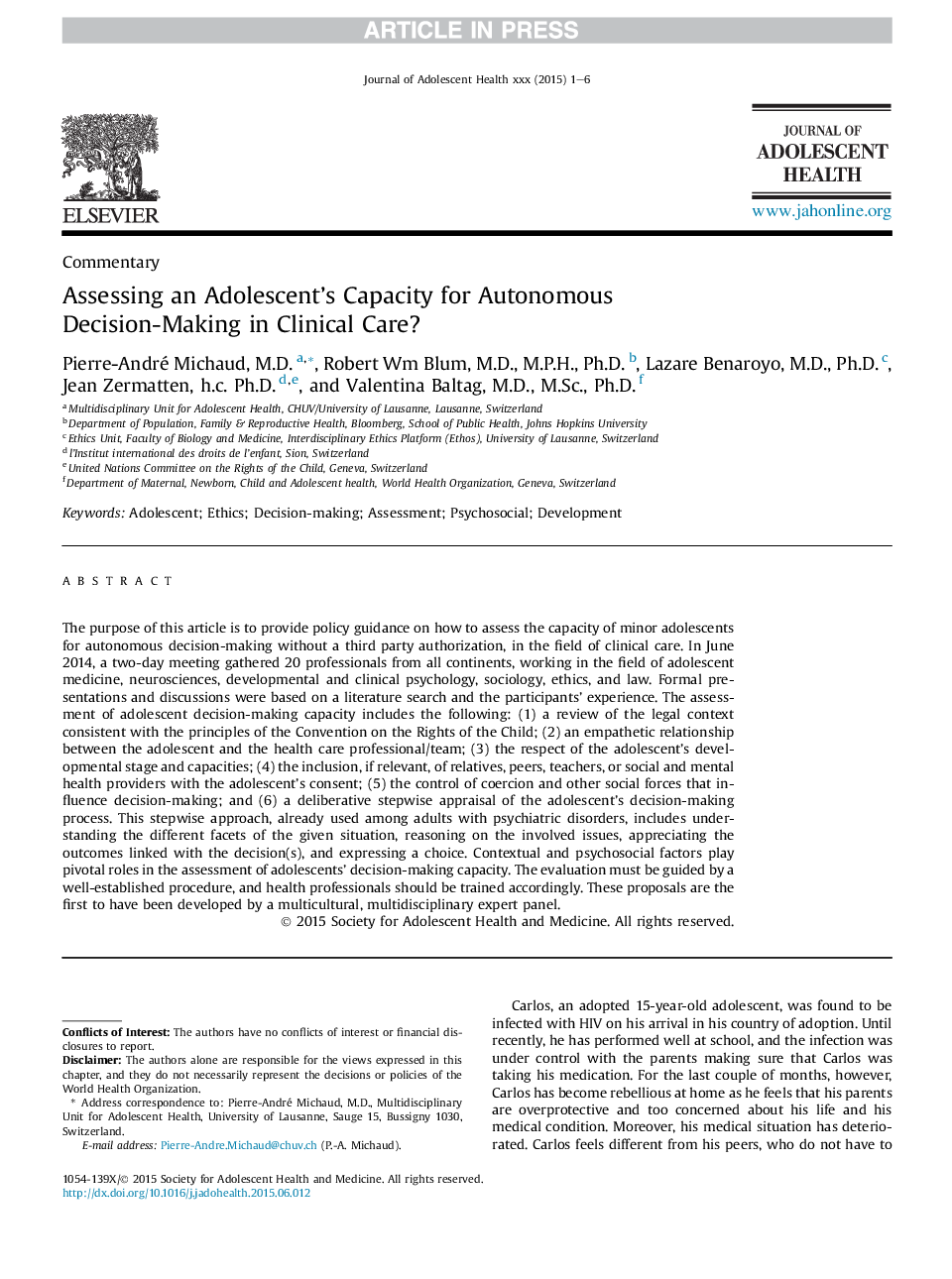| کد مقاله | کد نشریه | سال انتشار | مقاله انگلیسی | نسخه تمام متن |
|---|---|---|---|---|
| 10511314 | 950431 | 2015 | 6 صفحه PDF | دانلود رایگان |
عنوان انگلیسی مقاله ISI
Assessing an Adolescent's Capacity for Autonomous Decision-Making in Clinical Care
ترجمه فارسی عنوان
ارزیابی ظرفیت نوجوانان برای تصمیم گیری مستقل در مراقبت های بالینی در ایالات متحده
دانلود مقاله + سفارش ترجمه
دانلود مقاله ISI انگلیسی
رایگان برای ایرانیان
کلمات کلیدی
نوجوانان اخلاق، تصمیم سازی، ارزیابی، روانی اجتماعی، توسعه،
ترجمه چکیده
هدف از این مقاله ارائه راهنمایی های سیاسی در مورد چگونگی ارزیابی ظرفیت نوجوانان جزئی برای تصمیم گیری مستقل بدون مجوز شخص ثالث در زمینه مراقبت های بالینی است. در ماه ژوئن 2014، یک جلسه دو روزه، 20 متخصص از همه قاره ها، در زمینه پزشکی نوجوانان، علوم اعصاب، روانشناسی توسعه و روانشناسی بالینی، جامعه شناسی، اخلاق و قانون، جمع آوری شد. سخنرانی های رسمی و بحث بر اساس یک مطالعه ادبی و تجربه شرکت کنندگان بود. ارزیابی ظرفیت تصمیم گیری نوجوانان شامل موارد زیر می باشد: (1) مرور زمینه قانونی مطابق با اصول کنوانسیون حقوق کودک؛ (2) روابط دوستانه بین نوجوان و حرفه ای / تیم مراقبت های بهداشتی؛ (3) احترام به مرحله و ظرفیت های رشد نوجوانان؛ (4) در صورت لزوم شامل بستگان، همسالان، معلمان یا ارائه دهندگان خدمات بهداشتی و اجتماعی و اجتماعی با رضایت نوجوانان؛ (5) کنترل جبر و سایر نیروهای اجتماعی که بر تصمیم گیری تاثیر می گذارد؛ و (6) ارزیابی گام به گام مشورتی در روند تصمیم گیری نوجوانان. این رویکرد مرحله ای که قبلا در میان افراد بزرگسال مبتلا به اختلالات روانپزشکی مورد استفاده قرار گرفته است، شامل درک جنبه های مختلف وضعیت داده شده، استدلال در مسائل مربوط به آن، ارزیابی نتایج مرتبط با تصمیم (ها) و بیان یک انتخاب است. عوامل زمینه ساز و روان شناختی نقش مهمی را در ارزیابی ظرفیت تصمیم گیری نوجوانان ایفا می کنند. ارزیابی باید به روش صحیح هدایت شود و متخصصین بهداشتی باید آموزش ببینند. این پیشنهادها برای اولین بار توسط یک گروه متخصص و چند فرهنگی توسعه داده شده است.
موضوعات مرتبط
علوم پزشکی و سلامت
پزشکی و دندانپزشکی
پریناتولوژی (پزشکی مادر و جنین)، طب اطفال و بهداشت کودک
چکیده انگلیسی
The purpose of this article is to provide policy guidance on how to assess the capacity of minor adolescents for autonomous decision-making without a third party authorization, in the field of clinical care. In June 2014, a two-day meeting gathered 20 professionals from all continents, working in the field of adolescent medicine, neurosciences, developmental and clinical psychology, sociology, ethics, and law. Formal presentations and discussions were based on a literature search and the participants' experience. The assessment of adolescent decision-making capacity includes the following: (1) a review of the legal context consistent with the principles of the Convention on the Rights of the Child; (2) an empathetic relationship between the adolescent and the health care professional/team; (3) the respect of the adolescent's developmental stage and capacities; (4) the inclusion, if relevant, of relatives, peers, teachers, or social and mental health providers with the adolescent's consent; (5) the control of coercion and other social forces that influence decision-making; and (6) a deliberative stepwise appraisal of the adolescent's decision-making process. This stepwise approach, already used among adults with psychiatric disorders, includes understanding the different facets of the given situation, reasoning on the involved issues, appreciating the outcomes linked with the decision(s), and expressing a choice. Contextual and psychosocial factors play pivotal roles in the assessment of adolescents' decision-making capacity. The evaluation must be guided by a well-established procedure, and health professionals should be trained accordingly. These proposals are the first to have been developed by a multicultural, multidisciplinary expert panel.
ناشر
Database: Elsevier - ScienceDirect (ساینس دایرکت)
Journal: Journal of Adolescent Health - Volume 57, Issue 4, October 2015, Pages 361-366
Journal: Journal of Adolescent Health - Volume 57, Issue 4, October 2015, Pages 361-366
نویسندگان
Pierre-André M.D., Robert Wm M.D., M.P.H., Ph.D., Lazare M.D., Ph.D., Jean h.c. Ph.D., Valentina M.D., M.Sc., Ph.D.,
